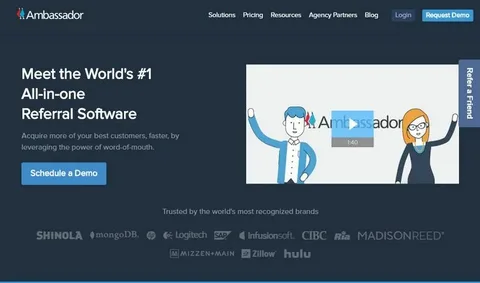Referral programs have long been a cornerstone of growth strategies for businesses, but in 2025, referral software trends are reshaping how companies attract, engage, and retain customers. With technology evolving at a rapid pace, businesses are leveraging new tools and strategies to make referrals more efficient, measurable, and impactful than ever before.
The Rise of AI-Powered Referral Programs
One of the most significant referral software trends in 2025 is the integration of artificial intelligence. AI allows businesses to personalize referral campaigns based on customer behavior and preferences. By analyzing data such as purchase history, social activity, and engagement patterns, AI can predict which customers are most likely to participate in referral programs and tailor incentives accordingly.
For example, an AI-powered system can identify a loyal customer and automatically suggest relevant rewards or highlight friends who might benefit from the product. This level of personalization not only increases participation but also improves the quality of referrals.
Seamless Multi-Channel Integration
Another key factor driving successful referrals in 2025 is the ability to integrate referral software across multiple channels. Today’s consumers interact with brands via social media, email, SMS, and mobile apps. Modern referral tools allow businesses to create cohesive campaigns that function seamlessly across all these platforms.
This multi-channel approach ensures that customers can refer their friends in the way that is most convenient for them. Companies that embrace this trend see higher conversion rates because they meet customers where they are, making the referral process effortless and natural.
Gamification and Incentives
Gamification has emerged as a powerful driver in referral programs. In 2025, referral software trends increasingly include game-like features, such as point systems, leaderboards, and tiered rewards. These elements make the referral process more engaging and motivate participants to refer more frequently.
Tiered rewards, for instance, incentivize customers to make multiple referrals by offering increasingly valuable prizes. This strategy not only boosts engagement but also turns loyal customers into brand advocates, creating a ripple effect that drives long-term growth.
Analytics and Data-Driven Optimization
Modern referral software is no longer just a tracking tool—it’s an analytics powerhouse. Businesses are now using advanced reporting and predictive analytics to understand what drives successful referrals. By monitoring metrics such as conversion rates, referral frequency, and ROI, companies can continuously optimize their campaigns for maximum impact.
Data-driven insights also help identify top-performing referrers and the most effective rewards. This ensures that marketing budgets are spent wisely and that referral programs deliver measurable results.
The Future of Referral Programs
As we move deeper into 2025, referral software trends indicate a continued focus on personalization, integration, gamification, and data-driven strategies. Companies that adopt these innovations will be better positioned to turn satisfied customers into powerful advocates, ultimately driving growth and customer loyalty in increasingly competitive markets.
In conclusion, understanding and leveraging the latest referral software trends is essential for businesses looking to enhance the effectiveness of their referral programs. By embracing AI, multi-channel integration, gamification, and analytics, companies can create referral campaigns that are smarter, more engaging, and more successful than ever before.


